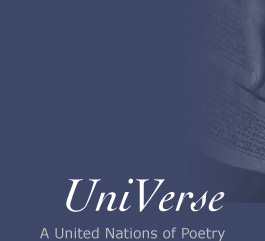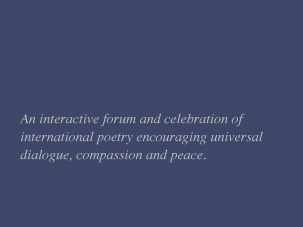| |
 |
 |
 |
Nikola Madzirov is one of the most powerful voices of the new European poetry. He was born in a family of Balkan Wars refugees in 1973 in Strumica, Macedonia. His award-winning poetry has been translated into thirty languages and published in collections and anthologies in the United States, Europe, and Asia. In 2011 BOA Editions published a selection of his poetry in the US entitled Remnants of Another Age. In the foreword, Carolyn Forché tells us, "Madzirov calls himself 'an involuntary descendant of refugees', referring to his family's flight from the Balkan Wars a century ago: his surname derives from mazir or majir, meaning 'people without a home'. The ideas of shelter and of homelessness, of nomadism, and spiritual transience serves as a palimpsest in these Remnants"—while Madzirov himself tells us in one of his poems, "History is the first border I have to cross."
For more information on poet Nikola Madzirov, see Blue Flower Arts.
Translations from Macedonian by
Peggy and Graham W. Reid, Magdalena Horvat, and Adam Reed. Poems from
"Remants of Another Age" BOA Editions (USA, 2011)
|
 |
 |
Macedonian version
ПО НАС
Еден ден некој ќе ги здипли нашите ќебиња
и ќе ги прати на хемиско чистење
од нив да го истрие последното зрнце сол,
ќе ги отвори нашите писма и ќе ги реди по датуми
наместо по исчитаност.
Еден ден некој ќе го размести мебелот во собата
како шаховски фигури на почеток од нова игра,
ќе ја отвори старата кутија за чевли
во која ги чуваме паднатите копчиња од пижамите,
недотрошените батерии и гладта.
Еден ден ќе ни се врати болката во 'рбетот
од тежината на хотелските клучеви и
сомнежот со кој рецепционерот ни го подава
далечинскиот управувач.
Туѓите сожалувања ќе тргнат по нас
како месечина по заталкано дете.
English version
After Us
One day someone will fold our blankets
and send them to the cleaners
to scrub the last grain of salt from them,
will open our letters and sort them out by date
instead of by how often they’ve been read.
One day someone will rearrange the room’s furniture
like chessmen at the start of a new game,
will open the old shoebox
where we hoard pyjama-buttons,
not-quite-dead batteries and hunger.
One day the ache will return to our backs
from the weight of hotel room keys
and the receptionist’s suspicion
as he hands over the TV remote control.
Others’ pity will set out after us
like the moon after some wandering child.
|
 |
 |
Macedonian version
НЕ ЗНАМ
Далечни се сите куќи што ги сонувам,
далечни се гласовите на мајка ми што на
вечера ме повикува, а јас трчам кон полињата со жито.
Далечни сме ние како топка што го промашува голот
и оди кон небото, живи сме
како термометар кој е точен само тогаш кога
ќе погледнеме кон него.
Далечната стварност секој ден ме испрашува
како непознат патник што ме буди на половина пат
со прашање „Тој ли е автобусот?“,
а јас му велам „Да“, но мислам „Не знам“,
не знам каде се градовите на твоите дедовци
што сакаат да ги напуштат сите откриени болести
и лековите што содржат трпеливост.
Сонувам за куќа на ридот од нашите копнежи,
да гледам како брановите на морето го исцртуваат
кардиограмот на нашите падови и љубови,
како луѓето веруваат за да не потонат
и чекорат за да не бидат заборавени.
Далечни се сите колиби во кои се криевме од дождот
и од болката на срните што умираа пред очите на ловците
кои беа повеќе осамени, отколку гладни.
Далечниот миг секој ден ми поставува прашање
„Тој ли е прозорецот? Тој ли е животот?“, а јас му велам
„Да“, а всушност „Не знам“, не знам кога
птиците ќе прозборат, а да не кажат „Небо“.
English version
I Don't Know
Distant are all the houses I am dreaming of,
distant is the voice of my mother
calling me for dinner, but I run toward the fields of wheat.
We are distant like a ball that misses the goal
and goes toward the sky, we are alive
like a thermometer that is precise only when
we look at it.
The distant reality every day questions me
like an unknown traveler who wakes me up in the middle of the journey
saying Is this the right bus?,
and I answer Yes, but I mean I don't know,
I don't know the cities of your grandparents
who want to leave behind all discovered diseases
and cures made of patience.
I dream of a house on the hill of our longings,
to watch how the waves of the sea draw
the cardiogram of our falls and loves,
how people believe so as not to sink
and step so as not to be forgotten.
Distant are all the huts where we hid from the storm
and from the pain of the does dying in front of the eyes of the hunters
who were more lonely than hungry.
The distant moment every day asks me
Is this the window? Is this the life? and I say
Yes, but I mean I don't know, I don't know if
birds will begin to speak, without uttering A sky.
|
 |
 |
Macedonian version
БРЗ Е ВЕКОТ
Брз е векот. Да бев ветер,
ќе ги лупев корите на дрвјата
и фасадите на периферните згради.
Да бев злато, ќе ме криеја во подруми,
во ровлива земја и меѓу скршени играчки,
ќе ме заборавеа татковците, а нивните синови
трајно ќе ме паметеа.
Да бев куче, немаше да ми биде страв
од бегалци, да бев месечина немаше
да се плашам од смртни казни.
Да бев ѕиден часовник
ќе ги криев пукнатините на ѕидот.
Брз е векот. Ги преживуваме слабите земјотреси
гледајќи кон небото, а не кон земјата.
Ги отвораме прозорците за да влезе воздух
од местата каде што никогаш не сме биле.
Војни не постојат, зашто секој ден некој
го ранува нашето срце. Брз е векот.
Побрз од зборот.
Да бев мртов, сите ќе ми веруваа
кога молчам.
English version
Fast is the Century
Fast is the century. If I were wind
I would have peeled the bark off the trees
and the facades off the buildings in the outskirts.
If I were gold, I would have been hidden in cellars,
into crumbly earth and among broken toys,
I would have been forgotten by the fathers,
and their sons would remember me forever.
If I were a dog, I wouldn't have been afraid of
refugees, if I were a moon
I wouldn't have been scared of executions.
If I wеre a wall clock
I would have covered the cracks on the wall.
Fast is the century. We survive the weak earthquakes
watching towards the sky, yet not towards the ground.
We open the windows to let in the air
of the places we have never been.
Wars don't exist,
since someone wounds our heart every day.
Fast is the century.
Faster than the word.
If I were dead, everyone would have believed me
when I kept silent.
|
 |
 |
Macedonian version
ПРЕД ДА СЕ РОДИМЕ
Улиците беа асфалтирани
пред да се родиме и сите
соѕвездија веќе беа формирани.
Лисјата гниеја
до работ на тротоарот.
Среброто црнееше врз
кожата на работниците.
Нечии коски растеа низ
должината на сонот.
Европа се обединуваше
пред да се родиме и косата
на една девојка спокојно
се ширеше врз површината
на морето.
English version
Before We Were Born
The streets were asphalted
before we were born and all
the constellations were already formed.
The leaves were rotting
on the edge of the pavement,
the silver was tarnishing
on the workers’ skin,
someone’s bones were growing through
the length of the sleep.
Europe was uniting
before we were born and
a woman’s hair was spreading
calmly over the surface
of the sea.
|
 |
 |
Macedonian version
ДОМ
Живеев на крајот од градот
како улично светло на кое никој
не му ја менува светилката.
Пајажината ги држеше ѕидовите заедно,
потта нашите споени дланки.
Во преобразбите на невешто соѕиданите камења
го криев плишаното мече
спасувајќи го од сонот.
Деноноќно го оживував прагот
враќајќи се како пчела што
секогаш се враќа на претходниот цвет.
Беше мир кога го напуштив домот:
гризнатото јаболко не беше потемнето,
на писмото стоеше марка со стара напуштена куќа.
Кон тивките простори од раѓање се движам
и под мене празнини се лепат
како снег што не знае дали на земјата
или на воздухот припаѓа.
English version
Home
I lived at the edge of the town
like a streetlamp whose light bulb
no one ever replaces.
Cobwebs held the walls together,
and sweat our clasped hands.
I hid my teddy bear
in holes in crudely built stone walls
saving him from dreams.
Day and night I made the threshold come alive
returning like a bee that
always returns to the previous flower.
It was a time of peace when I left home:
the bitten apple was not bruised,
on the letter a stamp with an old abandoned house.
From birth I’ve migrated to quiet places
and voids have clung beneath me
like snow that doesn’t know if it belongs
to the earth or to the air.
|
 |
 |
Macedonian version
БЕШЕ ПРОЛЕТ
Беше пролет кога окупаторот ги
запали тапиите од имотот каде ловевме птици,
шарени инсекти, пеперуги што постојат
уште во старите учебници по биологија.
Многу нешта оттогаш го изменија
светот, многу нешта светот измени во нас.
English version
It Was Spring
It was spring when the invader
burned the deeds to the land where we hunted birds,
colourful insects, butterflies
existing only in old biology text-books.
Many things have changed the world
since then, the world has changed many things in us.
|
 |
 |
Macedonian version
ОДВОЕН
Се одвоив од секоја вистина за почетоците
на стеблата, реките и градовите.
Имам име што ќе биде улица на разделби
и срце што се појавува на рендгенски снимки.
Се одвоив и од тебе, мајко на сите неба
и куќи на безгрижноста.
Сега крвта ми е бегалец што припаѓа
на неколку души и отворени рани.
Мојот бог живее во фосфор од чкорче,
во пепелта што го чува обликот на пресеченото дрво.
Не ми треба мапата на светот кога заспивам.
Сега сенка од класје жито ја покрива мојата надеж,
и мојот збор е вреден
како стар семеен часовник што не го мери времето.
Се одвоив од себе, за да стасам до твојата кожа
што мириса на мед и ветер, до твоето име
што значи немир што ме успокојува,
што ги отвора портите на градовите во кои спијам,
а не живеам. Се одвоив од воздухот, од водата, од огнот.
Земјата од која сум создаден
е вградена во мојот дом.
English version
Separated
I separated myself from each truth about the beginnings
of rivers, trees, and cities.
I have a name that will be a street of goodbyes
and a heart that appears on X-ray films.
I separated myself even from you, mother of all skies
and carefree houses.
Now my blood is a refugee that belongs
to several souls and open wounds.
My god lives in the phosphorous of a match,
in the ashes holding the shape of the firewood.
I don't need a map of the world when I fall asleep.
Now the shadow of a stalk of wheat covers my hope,
and my word is as valuable
as an old family watch that doesn't keep time.
I separated from myself, to arrive at your skin
smelling of honey and wind, at your name
signifying restlessness that calms me down,
opening the doors to the cities in which I sleep,
but don't live.
I separated myself from the air, the water, the fire.
The earth I was made from
is built into my home.
|
 |
 |
Macedonian version
СЕНКИТЕ НÈ ОДМИНУВААТ
Еден ден ќе се сретнеме,
како бротче од хартија и
лубеница што се лади во реката.
Немирот на светот ќе
биде со нас. Со дланките
ќе го помрачиме сонцето и со фенер
ќе се доближуваме.
Еден ден ветрот нема
да го промени правецот.
Брезата ќе испрати лисја
во нашите чевли пред прагот.
Волците ќе тргнат по
нашата невиност.
Пеперутките ќе го остават
својот прав врз нашите образи.
Една старица секое утро
ќе раскажува за нас во чекалната.
И ова што го кажувам е
веќе кажано: го чекаме ветрот
како две знамиња на граничен премин.
Еден ден сите сенки
ќе нè одминат.
English version
Shadows Pass Us By
We’ll meet one day,
like a paper boat and
a watermelon that’s been cooling in the river.
The anxiety of the world will
be with us. Our palms
will eclipse the sun and we’ll
approach each other holding lanterns.
One day, the wind won’t
change direction.
The birch will send away leaves
into our shoes on the doorstep.
The wolves will come after
our innocence.
The butterflies will leave
their dust on our cheeks.
An old woman will tell stories
about us in the waiting room every morning.
Even what I’m saying has
been said already: we’re waiting for the wind
like two flags on a border.
One day every shadow
will pass us by.
|
 |
 |
Macedonian version
ОБИЧНОТО ЛЕТНО ЗАНОЌУВАЊЕ
1.
Така изгледа летното заноќување:
прељубницата излегува на балконот
во свилена ношница трепетот на ѕвездите
што го пропушта, гранче паѓа од клунот на
птицата што заспива пред да го изгради домот,
еден војник го спушта државното знаме
со писмо од мајка му во џебот и
атомските проби во утробата на земјата
тајно ги оживуваат мртвите. Некој во мигот
тивко ги толкува византиските неуми,
друг ги преправа егзодусите на балканските
и граѓански војни во името на универзалните
вистини. Во фабричките дворови
спијат статуите на учесниците во
поништените револуции, врз складните
гробови пластичните цвеќиња ја губат
бојата, а обичните формата,
и ова спокојство на мртвите
од кои сме се простиле,
не е наше.
2.
Во селото со три осветлени прозорци
една бајачка ги предвидува само
оздравувањата, не и заболувањата.
Брановите исфрлаат шишиња
цело море што можат да го впијат во себе,
стрелката од знакот за задолжителен правец
покажува кон Бог,
рибарот откинува парче од небото
фрлајќи ја јадицата кон реката,
сиромашно дете ја бара Малата Мечка
и планетата од која би сакал да потекнува,
пред прагот на убиецот со алиби
еден пердув се обидува да летне.
Така изгледа обичното летно заноќување.
Градот согорува во црвенилото на месечината
и противпожарните скали чиниш водат кон
рајот, дури и тогаш кога сите
се
симнуваат
по
нив.
English version
Usual Summer Nightfall
1.
This is what summer nightfall is like:
the adulteress comes onto the balcony
in a silk nightgown that lets through
the trembling of the stars,
a twig drops from the beak of a bird
that falls asleep before it has built its home,
a soldier lowers the flag of the state
with a letter from his mother in his pocket
and atomic tests in the womb of the earth
secretly revive the dead. At that moment someone
quietly interprets Byzantine neumes *
,
someone else falsifies the exoduses
of the Balkan and the civil wars
in the name of universal truths.
In the factory yards
the statues of participants
in annulled revolutions sleep,
on the symmetrical graves
plastic flowers lose their colour
and ordinary ones their shape,
but this peace of the dead
we have parted from
is not ours.
2.
In the village with three lit windows
a fortune-teller foresees only
recoveries, and not illnesses.
The waves throw up bottles enough
to hold the whole sea,
the arrow on the one-way road sign
points to God,
a fisherman rips off a bit of the sky
as he casts his baited line into the river,
some poor child searches for the Little Bear
and the planet he’d like to come from,
in front of the doorstep of the killer with an alibi
a feather attempts to fly.
This is what usual summer nightfall is like.
The town combusts in the redness of the moon
and the fire brigade ladders seem
to lead to heaven, even then when
everyone
is climbing
down
them.
* Basic elements of Eastern systems of musical notation prior to the
invention of five-line staff notation.
|
 |
 |
Macedonian version
МНОГУ НЕШТА СЕ СЛУЧИЈА
Многу нешта се случија
додека Земјата се вртеше врз
Божјиот прст.
Жиците се ослободија
од далноводите и сега
сврзуваат љубови.
Капките од океанот
нестрпливо се таложеа врз
ѕидовите на пештерите.
Цвеќињата се одделија
од минералите и тргнаа
по мирисот.
Од задниот џеб се разлетаа
ливчиња низ нашата прозрачна соба:
безначајни нешта кои никогаш
не би ги направиле доколку
не ни беа запишани.
English version
Many Things Happened
Many things happened
while the Earth was spinning on
God’s finger.
Wires released themselves
from pylons and now
they connect one love to another.
Ocean drops
deposited themselves eagerly
onto caves’ walls.
Flowers separated
from minerals and set off
following the scent.
From the back pocket pieces of paper
started flying all over our airy room:
irrelevant things which we’d
never do unless
they were written down.
|
|  |
|





